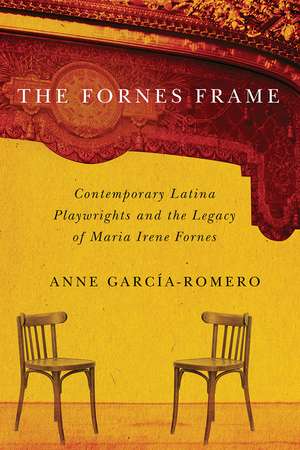The Fornes Frame: Contemporary Latina Playwrights and the Legacy of Maria Irene Fornes
Autor Anne García-Romeroen Limba Engleză Paperback – 24 mar 2016
A key way to view Latina plays today is through the foundational frame of playwright and teacher Maria Irene Fornes, who has trained a generation of theatre artists and transformed the field of American theatre. Fornes, author of Fefu and Her Friends and Sarita and a nine-time Obie Award winner, is known for her plays that traverse cultural, spiritual, and aesthetic borders.
In The Fornes Frame: Contemporary Latina Playwrights and the Legacy of Maria Irene Fornes, Anne García-Romero considers the work of five award-winning Latina playwrights in the early twenty-first century, offering her unique perspective as a theatre studies scholar who is also a professional playwright.
The playwrights in this book include Pulitzer Prize–winner Quiara Alegría Hudes; Obie Award–winner Caridad Svich; Karen Zacarías, resident playwright at Arena Stage in Washington, DC; Elaine Romero, member of the Goodman Theatre Playwrights Unit in Chicago, Illinois; and Cusi Cram, company member of the LAByrinth Theater Company in New York City.
Using four key concepts—cultural multiplicity, supernatural intervention, Latina identity, and theatrical experimentation—García-Romero shows how these playwrights expand past a consideration of a single culture toward broader, simultaneous connections to diverse cultures. The playwrights also experiment with the theatrical form as they redefine what a Latina play can be. Following Fornes’s legacy, these playwrights continue to contest and complicate Latina theatre.
In The Fornes Frame: Contemporary Latina Playwrights and the Legacy of Maria Irene Fornes, Anne García-Romero considers the work of five award-winning Latina playwrights in the early twenty-first century, offering her unique perspective as a theatre studies scholar who is also a professional playwright.
The playwrights in this book include Pulitzer Prize–winner Quiara Alegría Hudes; Obie Award–winner Caridad Svich; Karen Zacarías, resident playwright at Arena Stage in Washington, DC; Elaine Romero, member of the Goodman Theatre Playwrights Unit in Chicago, Illinois; and Cusi Cram, company member of the LAByrinth Theater Company in New York City.
Using four key concepts—cultural multiplicity, supernatural intervention, Latina identity, and theatrical experimentation—García-Romero shows how these playwrights expand past a consideration of a single culture toward broader, simultaneous connections to diverse cultures. The playwrights also experiment with the theatrical form as they redefine what a Latina play can be. Following Fornes’s legacy, these playwrights continue to contest and complicate Latina theatre.
Preț: 183.94 lei
Nou
Puncte Express: 276
Preț estimativ în valută:
35.20€ • 37.64$ • 29.35£
35.20€ • 37.64$ • 29.35£
Carte indisponibilă temporar
Doresc să fiu notificat când acest titlu va fi disponibil:
Se trimite...
Preluare comenzi: 021 569.72.76
Specificații
ISBN-13: 9780816531448
ISBN-10: 0816531447
Pagini: 256
Ilustrații: 19 halftones
Dimensiuni: 140 x 216 x 18 mm
Greutate: 0.29 kg
Ediția:First Edition
Editura: University of Arizona Press
Colecția University of Arizona Press
ISBN-10: 0816531447
Pagini: 256
Ilustrații: 19 halftones
Dimensiuni: 140 x 216 x 18 mm
Greutate: 0.29 kg
Ediția:First Edition
Editura: University of Arizona Press
Colecția University of Arizona Press
Notă biografică
Anne García-Romero is a playwright and theatre studies scholar. Her plays include Paloma, Provenance, Earthquake Chica, Mary Peabody in Cuba, Mary Domingo, Juanita's Statue, and Santa Concepción. She has published numerous articles on Latina/o theatre, community-based theatre, and playwriting pedagogy. She is a founding member of the Latina/o Theatre Commons, and is the Thomas J. and Robert T. Rolfs Assistant Professor in the Department of Film, Television and Theatre at the University of Notre Dame.
Cuprins
List of Illustrations
Acknowledgments
Introduction: Defining the Fornes Frame
1 Maria Irene Fornes: The Fornes Frame
2 Caridad Svich: Imprinting the Fornes Frame
3 Karen Zacarías: Navigating Multiple Borders
4 Elaine Romero: Viewing Latin@ Realism
5 Cusi Cram: Performing Latina Identity
6 Quiara Alegría Hudes: Conducting Theatrical Experimentation
Conclusion: The Legacy of Maria Irene Fornes
Epilogue: Fornes Is the Frame
Appendix A. INTAR Hispanic Playwrights-in-Residence Laboratory
Appendix B. Contemporary Latina Playwrights
Notes
Bibliography
Index
Acknowledgments
Introduction: Defining the Fornes Frame
1 Maria Irene Fornes: The Fornes Frame
2 Caridad Svich: Imprinting the Fornes Frame
3 Karen Zacarías: Navigating Multiple Borders
4 Elaine Romero: Viewing Latin@ Realism
5 Cusi Cram: Performing Latina Identity
6 Quiara Alegría Hudes: Conducting Theatrical Experimentation
Conclusion: The Legacy of Maria Irene Fornes
Epilogue: Fornes Is the Frame
Appendix A. INTAR Hispanic Playwrights-in-Residence Laboratory
Appendix B. Contemporary Latina Playwrights
Notes
Bibliography
Index
Recenzii
“A privileged insider look into the works of these five outstanding playwrights.”—Teresa Marrero, co-editor of Out of the Fringe: Contemporary Latina/Latino Theatre and Performance
“The author’s conclusions about Fornes and the generation of Latina dramatists are incredibly important and insightful.”—Tiffany Ana López, editor of Growing up Chicana/o: An Anthology
"It takes time to appreciate fully the impact of a writer’s work and her teachings. This eloquent book is the result of Fornes's legacy and the many Latina writers she inspired."—Nilo Cruz, author of Anna in the Tropics
Descriere
A key way to view Latina plays today is through the foundational frame of playwright and teacher, Maria Irene Fornes, who has transformed American theatre. Considering Fornes’s legacy, Anne García-Romero shows how five award-winning playwrights continue to contest and complicate Latina theatre.
